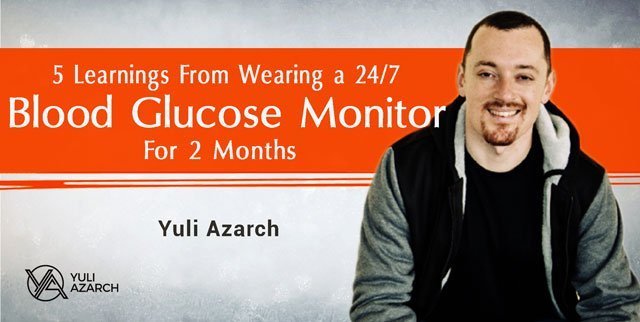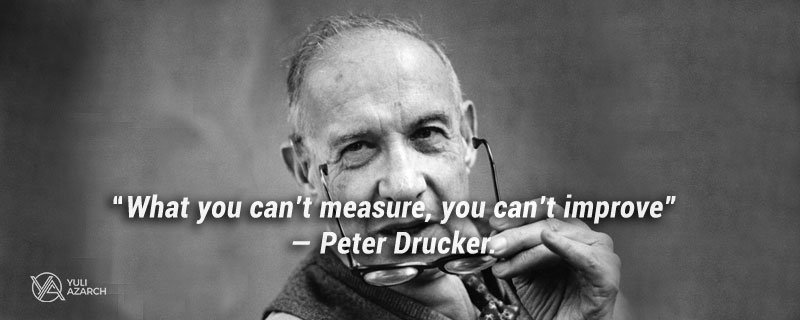5 Learnings From Wearing a 24/7 Blood Glucose Monitor For Two Months.
 Yuli Azarch | September 23, 2019 | No Comments on 5 Learnings From Wearing a 24/7 Blood Glucose Monitor For Two Months.
Yuli Azarch | September 23, 2019 | No Comments on 5 Learnings From Wearing a 24/7 Blood Glucose Monitor For Two Months.

Listen to the interview below:
I am always looking for ways to optimize my daily performance in life and health. So about two months ago, I decided to wear a blood glucose monitor 24/7.
So what is a glucose monitor 24/7?
Basically, it is a needle stuck to your finger 24/7. A sensor is attached to a small Bluetooth transmission device that measures and transmits your blood glucose data, at any moment of the day. With the device, you can see your blood glucose data and trends in real-time or at any moment of the day.
I had lots of interesting findings of my body during these last two months, just by measuring my blood glucose multiple times each day. Sometimes, I would even measure it a few times in an hour! With this information, I could see how different things impacted my body and how my performance was affected.
5 Learnings From Wearing 24/7 Blood Glucose Monitor For 2 Months.
Learning No.1: When you eat, is sometimes is more important than what you eat.
The time of the day when you eat something is what matters. But this is not only for food, I found out that this is also valid for supplements. I learned that when I eat carbs in the morning, my blood glucose would spike. This caused me to feel bad and with low energy. I would not enjoy myself and even get out of focus. But, it would take the same carbs at night, after having a balanced dinner, my blood glucose monitor would barely spiked. So, I found that my body absorbs better carbs in the evening.
I usually take 20-40 supplements a day. So I also measured the impact of my supplement intakes on my glucose levels at different times of the day.
In addition to that, not only the time of the day matters; but also the order of what you eat. I learned that having desserts or carbs after a balanced meal would cause me fewer glucose spikes. When I finished eating as earliest as possible, around 18:00 PM, my blood glucose monitor would be more stable and the next morning my fasting blood glucose would be lower. Opposite to this, if I had dinner later at night, around 21:00 PM, my blood glucose would be higher.
So, the same food eaten at different intervals of the day makes a big difference.
“I recommend everybody to learn when the body needs to eat. If you don’t have the glucose monitor, think about which food you can combine, by observing how you feel.”
Learning No2: Emotions impact your blood glucose.
I saw multiple times when I was stressed, angry, or I had negative emotions, that my blood glucose would spike. So that was a reminder for me that negative emotions impact our body. I had heard much about how these emotions impact your body but had never seen it as clear as this with my own eyes.
Big learning here for me, was to control my emotions to the best of my abilities. Mostly because I know I can’t make great decisions under the influence of negative emotions.
Learning No.3: How you feel overall has a direct correlation with how stable your blood glucose is.
When my blood glucose was stable during the day, I would also feel good and stable during the day. I would feel more relaxed, more focused, and I would suffer fewer ups and downs. But when my blood glucose was spiking, which had a correlation with eating too many carbs, I would have drops of energy, so I could focus less on my businesses.
Making sure that I have stable blood glucose, helps me ensure balanced energy throughout the day. This also positively impacts my performance, being more productive, and enjoying myself more.
Learning No.4: One great way to combine carbs is after a workout.
After a workout, it seems like the body can utilize the carbs better and the blood glucose has fewer spikes. This experience taught me to plan eating carbs or a piece of cake after big workouts. By doing this, I can still enjoy eating carbs but I don’t experience glucose spikes.
This recommendation may vary depending on the exercise and level of workout each person does on a daily basis. Lately, I have been eating a Keto diet which is mainly based on fat. But, if you are doing heavier workouts, your body might need more carbs. So be careful here, because not having enough carbs could have some health implications.
Learning No.5: What you can’t measure, you can’t improve.

This is a sentence that Peter Drucker says about businesses. Measuring my blood glucose levels, reminded me of this important distinction. This lesson is not only applicable to health, but I also think it is very useful for business. The more you measure something, the easier it is to improve it. By measuring my blood glucose 12 times a day, I managed to know what makes an impact in my body, and what I needed to optimize.
I also track my business regularly and other areas of my life, like my finances. I monitor almost everything to see if I am doing good or bad. And in the last ten years, everything I was able to measure on a regular basis I successfully improved it.
Final Recommendations.
In addition to the blood glucose monitor, I also wear the Oura Ring (https://ouraring.com/) which measures my sleep quality. With this device, I also track my sleep every time. I look at my sleep data once a day to see the things that I can improve in order to optimize my sleep quality.
Another interesting test I did recently, was the genetic test. This test gave me so much information about myself. Now, I know the areas I need to improve, to impact my health in a positive way. For me, both areas are interconnected.
“The healthier you are, the better you are able to perform”
If you are interested in monitoring your glucose levels, I recommend the company Dexcom based in the USA, or the company from Israel called FreeStile Libre. My total expenses for a month are around $300, which I find it to be highly valuable in order to learn about health.
Leave a Reply